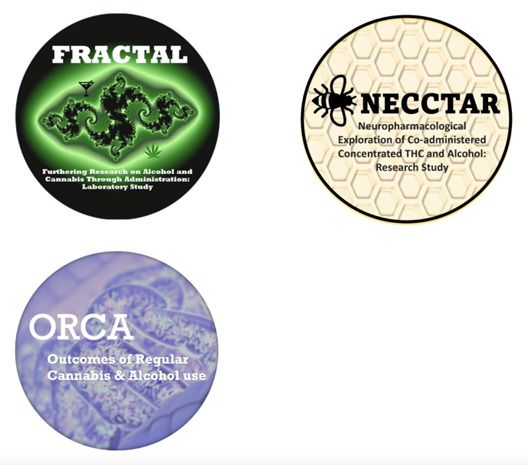
At No DUI Larimer, we talk a lot about cannabis and driving. And while we do know some things (that marijuana impairs driving for up to four hours after use, and that levels of THC found in the blood are higher when the same amount of cannabis is consumed with alcohol vs. without) there is a lot we don’t know, including exactly how THC is metabolized, why it affects people differently, and the best ways to test for impairment.
The truth is that research about marijuana is still emerging. In our state, recreational marijuana was legalized in 2012 – and 10 years is a short time in the world of research. Fort Collins’ own Colorado State University is a hub for research about the effects of cannabis on the body, particularly when consumed with alcohol.

The ENIGMA (Exploring Neurobiology, Individual Differences & Gut-Microbiome Mechanisms in Addiction) Lab is one such research site. Current studies include FRACTAL (Furthering Research on Alcohol and Cannabis Through Administration: Laboratory Study), ORCA (Outcomes of Regular Cannabis & Alcohol Use), and NECCTAR (Neuropharmacological Exploration of Co-Administered Concentrated THC and Alcohol: Research Study).
No DUI Larimer had the opportunity to speak with Hollis Karoly, PhD, an assistant professor in the Department of Psychology at CSU who runs the ENIGMA lab.
Q: Can you tell us about your job description and what you do on a daily basis?
A: My job as a faculty member in the psychology department at CSU has three components: research, teaching, and service. In the research capacity – which is the biggest part of my job – I run an active research lab. We are conducting multiple grant-funded studies on alcohol and cannabis.
I have a fantastic team of graduate students and undergraduate students who work in the lab on various aspects of the projects. Day-to-day, my research activities include data collection, data analysis, mentoring students, writing papers (i.e., scientific journal articles reporting on the results of our studies), and writing grant proposals to fund future studies.
I also teach graduate and undergraduate courses. The service part of the job involves service within CSU (e.g., serving on various academic committees) as well as service to the profession (e.g., peer-reviewing manuscripts for scientific journals, reviewing grant proposals for NIH and other funding agencies, serving on journal editorial boards, etc.).
![A black and white close-up photo of a marijuana leaf held between someone’s thumb and pointer finger.]](https://poweredbypartners.org/wp-content/uploads/2023/04/A-black-and-white-close-up-photo-of-a-marijuana-leaf-held-between-someones-thumb-and-pointer-finger..jpg)
Q: What studies are you currently conducting about the effects of marijuana and/or alcohol on the body?
Our FRACTAL study is ongoing, and is exploring the effects of legal market flower cannabis on alcohol consumption. It involves two experimental sessions in our mobile lab as well as completing daily reports of your alcohol and cannabis use (as well as some other health-related behaviors such as exercise) each day for two 14-day periods. This study also involves providing some blood samples and stool samples.
Our NECCTAR study is also ongoing, and is exploring the acute effects of cannabis concentrates when administered alongside a dose of alcohol. This work is important because many people co-use alcohol and cannabis, and we don’t have much research on the risks of co-using alcohol with very potent products such as legal-market cannabis concentrates. We’re interested in how cannabis concentrates impact alcohol intoxication, craving for alcohol and blood-alcohol concentration. This study involves providing some blood samples.
We are also conducting a study called ORCA, in which we are looking for individuals who ONLY use alcohol, only use cannabis or don’t use either. In this study, we are comparing the effects of cannabis and alcohol on mental health, inflammation, and gut health. This study involves providing a blood sample and a stool sample.
I am also conducting a study (with no name!) in which we are comparing responses to physical exercise among people who regularly use cannabis and those who do not. We are interested in how regular cannabis use may impact people’s physiological and psychological responses to aerobic exercise.
Q: What is the motivation behind studying the effects of marijuana, alone and with alcohol?
The alcohol and cannabis studies are mainly motivated by a few factors:
1) There is currently a lack of data on the effects of alcohol when administered alongside very potent cannabis products (such as those that people in Colorado can easily buy at a dispensary)
2) The fact that the research to date on alcohol and cannabis use is conflicting—some studies suggest that using cannabis prompts people to drink more, and others suggest that it can actually act as a “substitute” for alcohol, and can help people who want to cut down on their drinking to drink less. In my lab, we are especially interested in understanding for whom and under what conditions cannabis may serve as a substitute for alcohol
3) There is limited data on the biological effects of alcohol and cannabis co-use. Specifically, we are looking at inflammatory markers in the blood, gut biomarkers (which we collect from stool samples) and markers of endogenous cannabinoid system functioning

Q: Who funds marijuana research at the ENIGMA lab?
Our studies are funded by the National Institutes of Health (specifically the National Institute of Alcohol Abuse and Alcoholism, or NIAAA) and the Institute of Cannabis Research at CSU Pueblo, as well as several other internal funding sources at CSU.
Q: In our interactions with the community, we’ve seen that many people see studies about the effects of marijuana as attempts to restrict or discourage its use. How would you respond?
Some studies on cannabis use may ultimately support attempts to restrict its use. However, there is a considerable amount of ongoing research in the field currently that is focused on how cannabis or specific cannabinoids may serve beneficial functions across a range of physical and mental health conditions.
Most scientists conducting cannabis research are motivated to better understand both the harms and benefits of cannabis. Certainly, that may not be true for everyone doing cannabis research, but I would encourage young people who are interested in this topic to look into some of the published research on cannabis (and especially medicinal cannabis).
There are of course some studies supporting the harms of cannabis, but there are also many findings that support potentially beneficial effects of cannabis or cannabinoids in certain populations.
Q: What studies on these topics have you conducted in the past? Is there anywhere the public can access those?
I have published many studies of these topics in the past. The public can easily access PDFs of my publications from the publications section of our ENIGMA lab website
(https://psychlabs.colostate.edu/karolylab/publications/).
Q: Are you still looking for participants for any studies?
Yes, we are still looking for participants for all of our studies! Our website is a good place to go to see what studies we are currently running. You can also email us at enigmalabcsu@gmail.com to learn more.
No DUI Larimer encourages all of our readers: Educate yourself about how cannabis, alcohol, and other substances affect you and how you can avoid driving impaired – take charge of your future. Make the Right Call.
Follow No DUI Larimer on Facebook, Instagram, and Pinterest for more ways you can combat impaired driving in our community.

![Partners [Logo Reversed]](https://poweredbypartners.org/wp-content/uploads/2020/06/partners-horiz-no-tag-sm-rgb-color-purple.png)